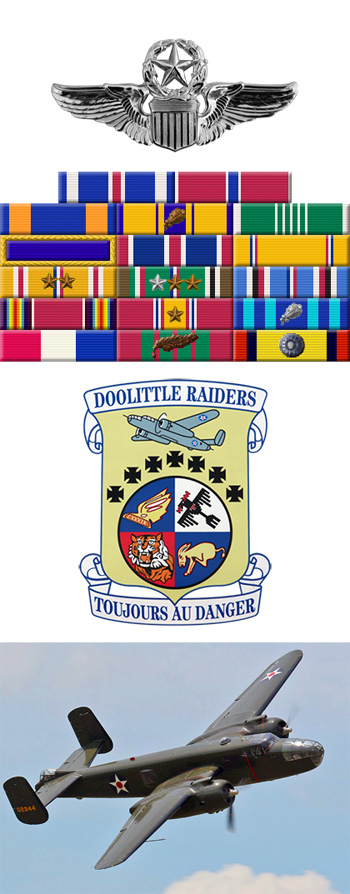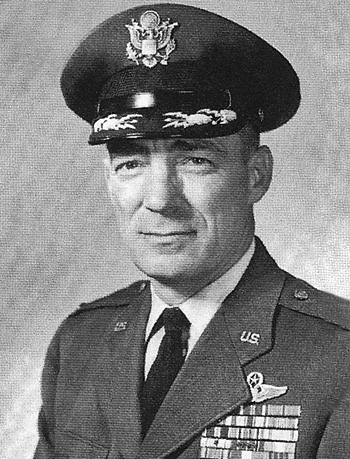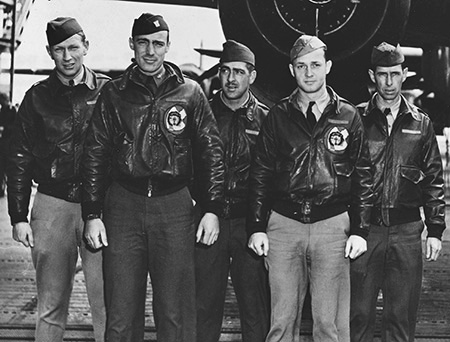
|
William M. Bower |
 |
|||
| Rank, Service | ||||
Colonel O-6, U.S. Air Force |
||||
| Veteran of: | ||||
|
||||
| Tribute: | ||||
Bill Bower was born on February 13, 1917, in Ravenna, Ohio. He enlisted in the Ohio National Guard on October 17, 1936, and served with the 107th Cavalry until receiving an honorable discharge on October 16, 1939. Bower then enlisted in the Aviation Cadet Program of the U.S. Army Air Corps on February 10, 1940, and was commissioned a 2d Lt and awarded his pilot wings at Kelly Field, Texas, on October 5, 1940. He served as a B-25 Mitchell pilot with the 37th Bomb Squadron of the 17th Bomb Group at McChord Field, Washington, before being selected for the Doolittle Mission in February 1942. Capt Bower was the pilot on the 12th B-25 to take off from the aircraft carrier USS Hornet (CV-8) on April 18, 1942, and after bombing its assigned targets in Yokohama, Japan, the crew bailed out over China when their aircraft ran out of fuel. He returned to the U.S. in June 1942, and participated in war bond tours for a month before deploying to England in July 1942. He was assigned to 12th Air Force in England from July 1942 to January 1943, and then deployed to North Africa as a B-25 pilot and Assistant Operations Officer for the 47th Bomb Wing from January to May 1943. His next assignment was as Operations Officer for the 310th Bomb Group in North Africa and on Corsica from May 1943 to September 1944, followed by service as Operations Officer for the 57th Bomb Wing in Italy from September 1944 to June 1945. Col Bower next served as Commander of the 310th Bomb Group in Italy from July to August 1945, returning to the U.S. later in August. He then served as Deputy Base Commander of the 593rd Air Force Base Unit at Charleston, South Carolina, from November 1945 to June 1946, and then as Deputy Base Commander of the 1455th Air Force Base Unit at Great Falls, Montana, from June to December 1946, and Base Commander from December 1946 to January 1947. He served as a member of the Army Air Force Interview Board in Boston, Massachusetts, from January to April 1947, and then served as Base Commander of Lowry AFB, Colorado, from August 1947 to July 1948. Col Bower attended Air Command and Staff College at Maxwell AFB, Alabama, from July to December 1948, and then served as a Senior Air Instructor to the Colorado Air National Guard at Lowry AFB from December 1948 to February 1949. His next assignment was with Headquarters U.S. Air Force in the Pentagon from February 1949 to November 1952, followed by service as Chief of Programs, Plans, and Requirements on the staff of Headquarters Northeast Air Command at Pepperrell AFB, Newfoundland, Canada, from December 1952 to May 1953. Col Bower served as Commander of the 6622nd Air Transport Squadron at Pepperrell AFB from May to June 1953, and then served as Commander of the 6614th Air Transport Group at Pepperrell from July 1953 to November 1955. His next assignment was on the staff of the 1002nd Inspector General Group at Norton AFB, California, from December 1955 to October 1958, followed by service as Base Commander of the 2589th Air Base Group at Dobbins AFB, Georgia, from November 1958 to July 1960. He next served as a liaison officer with the Rocky Mountain Region of Civil Air Patrol at Lowry AFB from July 1960 to August 1964, and then served as Director of Logistics for the 26th Air Division and 1st Air Force at Stewart AFB, New York, from August 1964 to April 1966. His final assignment was as Chief of the Logistics Branch for Overseas Affairs with 1st Air Force at Stewart AFB from April 1966 until his retirement from the Air Force on September 1, 1966. Col Bower was a Command Pilot and accumulated over 5,300 flying hours during his Air Force Career. Bill Bower died on January 10, 2011, and was buried at Arlington National Cemetery. |
||||
|
||||


